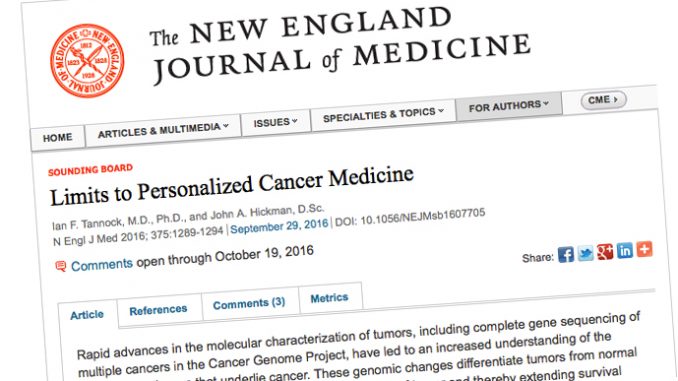
Is there too much hype surrounding personalized oncology? An article just published on The New England Journal of Medicine (available only to subscribers) essentially invites to use more caution: «There should be a clear message to patients that personalized cancer medicine has not led to gains in survival or its quality and is an appropriate strategy only within well-designed clinical trials» write in a “Sounding board” article Ian Tannock, of the Princess Margaret Cancer Center and the University of Toronto, Ontario, Canada, and John Hickman, an independent research consultant based in Paris, France.
There is no doubt that drugs that target different signaling pathways are becoming more and more available, but according to Tannock and Hickman most of them can assure only a partial effect: «With the possible exception of immune-checkpoint inhibitors, cancer cells have an almost universal capacity to develop resistance to a single molecular targeted agent by means of upregulation of the partially inhibited pathway, mutation of the target, or activation of alternative pathways» they write. In addition, many of these drugs are too toxic to be used in combination with other agents.
The intratumour heterogeneity poses an additional, particularly tough challenge: «Sensitive genetic characterization of individual cancer cells indicates that intratumor heterogeneity is present early in cancer development and that subclones are selected by cancer treatment» the paper explains, so that any agent that matches the molecular analysis of a single biopsy «is likely to have limited benefit because molecular pathways that are active in other parts of the tumor will lead to tumor growth from different clones of tumor cells»..
«The concept of personalized medicine is so appealing that seemingly only curmudgeons could criticize it» the authors conclude, after touching on the issue of the high cost of these drugs, whose price «is unrelated to value (i.e., to clinical effectiveness)». «We do not suggest abandoning personalized medicine but rather evaluating it in a small number of well-designed collaborative programs, with research programs that recognize and combat the limitations we have described».


